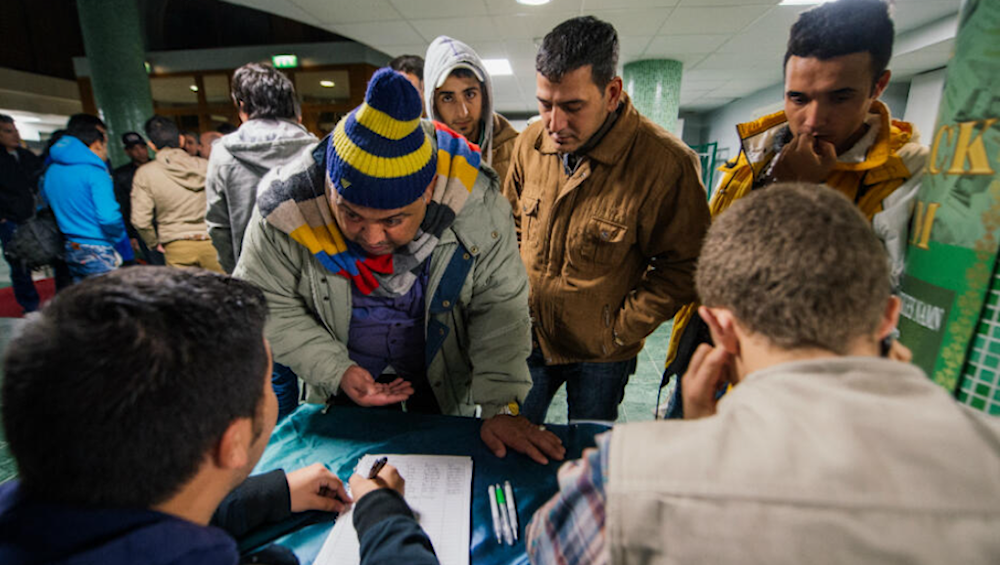Sweden’s ‘snitch law’ immigration plan slammed as 'utterly inhumane'
The plan would require up to a million personnel, including dentists and teachers, to disclose any interaction with undocumented patients, pupils, and authorities.
-

Refugees register their names as they arrive at Stockholm central mosque on October 15, 2015. (AFP)
Professional workers in Sweden like social workers and doctors have raised concern about a plan under consideration by a government-appointed committee that would require public sector personnel to report unauthorized persons to police.
The plan, dubbed the "snitch law" by critics, was one of several policies in a 2022 agreement reached by the country's four right-wing parties. The agreement paved the way for a coalition administration consisting of three of the country's center-right parties, with legislative backing from the far-right anti-immigrant Sweden Democrats (SD).
Almost two years after the SD became Sweden's largest party, work is underway to turn the plan regarding public sector workers into law. The government has directed the committee to provide ideas on how this may be put into legislation, and it is expected to present its conclusions to the government by the end of November.
The plan would require up to a million personnel, including dentists and teachers, to disclose any interaction with undocumented patients, pupils, and authorities, sparking backlash from activists and professional groups.
'Utterly inhumane'
Michele LeVoy of the Platform for International Cooperation on Undocumented Migrants called the proposal " utterly inhumane", explaining that people may be hesitant to take their children to school and even more reluctant to seek medical attention or report crimes against them.
"Why would anyone want to go somewhere when they know that the main thing that will happen is not that they can get care, not that they can go to school, not that they can go to the library – they’ll just be turned in.”
LeVoy described the measures as part of a rising tendency in Europe to criminalize solidarity with illegal individuals, worried it would damage years of trust and fuel bigotry and stigma.
"Everywhere where obligations to denounce undocumented people have been applied, the result has been more discrimination, suffering and fear."
Jacob Lind, a postdoctoral researcher in international migration at Malmö University, believes the Swedish plan will have little influence on lowering the number of persons without documents in the country, indicating that people would not leave but rather will end up "in further misery," adding that "society will have even less contact with people who are in this situation, further increasing their vulnerability and making them even more exploitable.”
As of December 2023, more than 150 Swedish regions, municipalities, labor unions, and other civil society organizations have spoken out against the proposal.
Sofia Rydgren Stale, the association's president of the Swedish Medical Association, is one of the groups that have spoken out. "I became a doctor to help people, not to monitor and report on them."
The group has maintained that reporting requirements would violate professional ethics guidelines and principles.
The Swedish government stated that the committee looking into how this may become legislation was also investigating whether the need to share information would clash with professional principles, such as those in healthcare.
In May of this year, the professional ethics committee formed by two Swedish unions representing teachers stated that the requirement to report would place them in an untenable situation.
According to Anna Troberg of the DIK labor union, more than 90% of librarians rejected the concept, affirming that they would rather lose their jobs than report those in need.

 4 Min Read
4 Min Read








